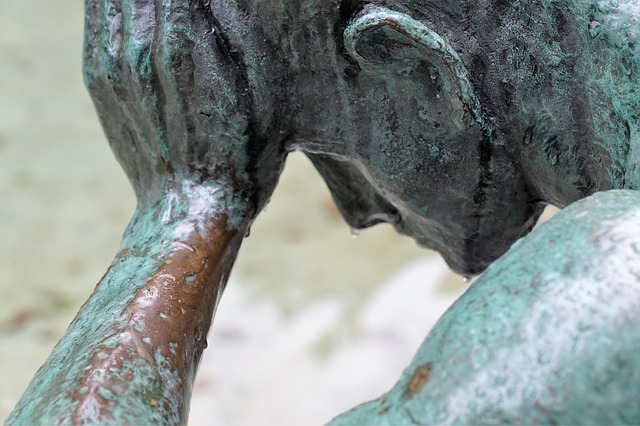What Good Has Christianity Done?
In the past several decades (one could say even the past century), there has been a steady decline in the valuation of religion on the lives of individuals and society as a whole. People have seen countless leaders fall or not live up to the standards they preach. Oftentimes in discussions, the first challenges against religion that are thrown out are things like The Crusades, using the Bible to endorse slavery in America, and the attacks on the World Trade Center in 9/11.
The attacks on 9/11 ushered in a new level of anti-religion rhetoric against all religions and not just the ideology of the men who crashed the planes into the Twin Towers. Yes, they said, Islamic Extremism motivated the men. But, it was a society with Christianity at its forefront that had somehow wronged them and motivated them to do such a deed.
One of the core principles of the success of the United States since the first settlers came is the practice of something called pragmatism. That’s just a big, fancy word that means you use what works and toss out what doesn’t. This can be applied to anything from the tools we use to build things to the systems we use to manufacture things or the education programs we develop to teach things or the social structures we have in place that make society better.
With the attacks on 9/11 – and the onslaught of books from New Atheism – the conversation often doesn’t care about whether Christianity is true or not. People don’t see it as doing any good anymore. When Apple Music exec Zane Lowe interviewed Katie Perry (who is the daughter of a pastor) and the topic of her beliefs came up, he basically said what a lot of people think; that he “doesn’t know what [religion] has done to help us evolve”. In other words, it doesn’t do us any good.
When New Atheists like Christopher Hitchens and Richard Dawkins became popular, a new sort of mindset started creeping into the conversations. For them, it wasn’t enough to just let religious people alone. Hitchens wrote a book titled God Is Not Great: How Religion Poisons Everything (underline mine). Richard Dawkins has equated religion to child abuse and called for people to mock and ridicule those who would believe in a higher power of some sort. You see, for them, it goes beyond simply stating that it isn’t true; the mindset is that it isn’t good. In fact, it’s poison.
How Has Christianity Changed The World?
I think it’s safe to say that most people would tell you the world ought to be better than it is right now. We still have a ways to go. For the record, I don’t think one should hold to a world view because of it’s pragmatism – because it “works” for you. I think you should hold to what you think is true; what best describes reality and the way things are. But, in the interest of keeping the discussion in the practical tone, let’s have a look at history to evaluate whether or not Christianity has done anything to “help us evolve”.
Early Adopters
Ancient Romans had a practice known as Exposure where they would leave unwanted infants to fend for themselves. This was usually done for a number of reasons. Maybe the family couldn’t afford another mouth to feed. Maybe the pregnancy was unplanned. Maybe the child was illegitimate. Maybe it had birth defects. Or, maybe it was the wrong gender.
Some of the children lucked out and were abandoned inside the city walls. If the infant survived, it might be adopted by a family who could not have children. More likely, though, it ended up as a slave.
Many infants, however, didn’t have it so lucky. They were abandoned outside the city walls. On trash piles and dung heaps. They either died of the elements or starvation or predators.
As a response to this practice, Christians of the day would rescue these abandoned infants and either adopt them into their own families or help find them homes. They cared for the ones they found who were on the brink of death and made sure the ones who had already died would receive a burial.
As time went on in the Roman empire, churches became places where parents could turn over their unwanted babies and the church would care for them. During this time, Christians were very vocal about cultural issues surrounding the practice of exposure and helped to get laws passed (or overturned) that would see it eventually canceled.
What about modern times? One challenge I encountered when discussing abortion online was that people who take a pro-life stance don’t offer any alternatives for mothers who do not want their babies. He told me that we say “no abortions!” and then leave the mother who is in a bad situation stuck with a mouth to feed. This isn’t true, though. Local churches have resources to help support mothers – whether that be during the pregnancy or after the baby is born. On a much larger scale, Christians run and contribute to centers that help provide services like contraception, ultrasounds, adoption services, education, and financial support. In fact, there are typically more of these centers in metropolitan areas than there are abortion clinics.
And, of course, there is the adoption process itself. Many adoption services are run by Christian organizations who desire to see infants be matched with parents who will care for and nurture the child.
Women’s Rights
In most areas of the time of Jesus, women were looked at as having less value than men. They couldn’t get a formal education, they couldn’t speak in public, they could be divorced for the simplest of reasons, and they had to wear veils in public. When testifying in court, their testimony was seen as half that of a man.
In terms of marriage and relationships, men of that area often had three women in his life. He had his wife with whom he had children, and who was in charge of running the house. He had a servant girl whom he could call on when the urge struck him, and he had a prostitute in the local temple with whom he could call on all in the name of “worship” to the god or goddess they served.
But, Jesus came along and changed all that. Jesus spoke to women in public. He allowed them to sit at his feat and learn. They traveled with him and helped support his ministry. And it was women who are recorded as first discovering Jesus’ tomb empty.
Jesus had a lot to say about the value of women by what he said about marriage. He taught that marriage was between one man and one woman. Not one man, his wife, his slave girl, and his prostitute. ONE woman. Marriage was to be monogamous.
Fast forward to today. The nations that have Christianity as a strong part of their foundation have seen this equality flourish over time. Women now have the opportunity to become highly educated. They have become business owners, CEOs of billion-dollar companies, they frequently hold positions of prominence in churches, they can be found at all levels of government. At the time of writing this article, the United States has a female Vice President. Many other nations in Europe have had or currently have female heads of government (prime ministers, presidents, chancellors, etc).
Many critics of the Bible and its treatment of women will point to the passage in Ephesians 5:22 where Paul tells women to submit to their husbands. But, they neglect to read the next section where it tells husbands how to treat their wives. Paul tells husbands that they are to love their wives as Christ loved the church. How did Christ love the church? He took on the punishment that the people who would become the church deserve and died for them. An innocent man. He did this because of how much value the church has to him. This is how men are to treat their wives; as the most valuable thing in their lives. Husbands are to stand in the gap, protect their wives, and treat them as the most valuable thing in existence. And her value isn’t tied to some worldly measure of beauty, financial value, or skill set. She has value simply because she is his wife.
Abolition of Slavery
In the times of Jesus, the Greco-Roman culture utilized the practice of slavery in a major way. Roman slavery was ugly and brutal. Slaves were beaten, dehumanized, raped, and used for whatever sick and twisted purposes their masters saw fit. People could buy their freedom, but they rarely lived long enough to do so.
New World slavery was even worse. New World slavery wasn’t people who were poor and needed to work off a debt; these were people who were kidnapped, ripped from their families and homes, transported thousands of miles away and put into forced labor with no hope of ever getting their freedom.
Finally, in the 1780s, a movement started in England to abolish the practice of slavery. One of its most prominent figures was a politician named William Wilberforce, who put forth laws to first end the slave trade and then in 1833 abolish the ownership of slaves altogether.
This movement was a Christian movement. Led by Christians who understood the value that God has placed on all life – no matter which gender you are, what color your skin is, what your social status is, or what your skill set is. Also, because we all have our origins with a common ancestor (Adam and Eve), there is no superior race. Ultimately, we all come from the same place.
The abolition of slavery took longer in the United States. Slavery was actually something they argued quite a bit over when the colonies were trying to unite. This is one of the things that the antislavery states had to compromise on with states who were heavily dependant on slave labor. They decided to compromise and put things in place that would lead to the freeing of slaves. They didn’t push the issue because they knew what would happen. And, they were right. The abolition of slavery ultimately took an extremely bloody civil war that ripped the nation in half and millions died in order to set the slaves free.
Care For The Sick and Dying
In the times of ancient Rome, healing was something one primarily received at a temple of Æsculapius. Healing was done by making sacrifices and putting you into a drug-induced dreamlike state (likely similar to anesthesia). In this state, you communed with the god and asked him for healing. There were some procedures performed, but most of the care was left up to the god’s whim.
Hippocrates (460-370 BC) is considered the father of modern medicine. He took medicine in more of a scientific direction. He predates Jesus by almost 300 years. At the time of Jesus, there were a handful of schools where one could learn to be a physician. So, doctors were not uncommon. But, still, many people brought their sick to the temples of the Greco Roman gods to be healed by sacrifice and ritual.
It wasn’t Christians who invented modern medicine. But, it was Christians who saw the value of life and, with this notion in mind, cared for those who others would not. For example, in 165 AD, there was a major plague in the Roman Empire. At the first sign of symptoms, the sick were tossed into the streets to die. People were either staying locked in their homes or fleeing from the cities. Even noted Roman physician Galen fled the city to his private estate to wait out the plague. A second plague struck the Roman world a century later with similarly devastating effects.
In both of these plagues, the Christian response was a little different than the rest of the Roman citizens. They would visit the sick to care for them and try to nurse them back to health. And the treatments they gave weren’t learned from any special medical schools. It was basic compassion. They brought food and water to the sick and tried to comfort them. For many, this was all it took to bring them back to health. It didn’t take special medicine or innovative treatment; just compassion and meeting basic human needs.
As the early church grew, hospital services became something they also offered to the communities they served. As time went on, separate hospitals began to be established, but under the guidance of the church. In America, Christian-based hospitals still make up a large chunk of medical centers and special care facilities. Just look at the names; St. Jude, Mt. Carmel, First Valley Presbyterian. All of these were founded by Christian churches. Many of these were the first hospitals in a given area.
Education
One of the most powerful methods for getting ahead in life is education. An education in countries like the US and in Europe is the main way someone can move from the lower class all the way up to the top. If you want to raise yourself out of poverty in the West, education will be a major part of that.
While schools certainly predated Christianity, the institutions that we would consider universities do not. The oldest universities still running were all founded by one denomination or another – the University of Bologna, Italy is the oldest (1088), followed by Oxford, England (1096), Salamanca, Spain (1134), and then Cambridge, England (1209).
In the US, the story is much the same. 106 of the first 108 colleges and universities in America were started by denominations in order to educate the clergy. Like their European counterparts, the goal was to make the individual well-rounded by learning theology, law, medicine, science, and the liberal arts.
Today, education is open to everyone. Many careers even require degrees from higher education. Universities still have tracts to help make people well-rounded. But, curricula now are more hyper-focused on getting people to specialize in one area or another.
Modern Science
Today, science and religion are often pitted against one another. As if they are two conflicting methods to gain understanding about the world around us. To many scientists, Christians are painted as people who cover their ears and eyes to the scientific method as a way to learn about the world. And, many Christians hear the word “science” and the first thing that comes to mind is Darwinian Evolution which leaves a bad taste in their mouth.
However, if we look back to the time labeled as the Scientific Revolution, we will see that many of the prominent figures of the time were Christians. And, it wasn’t that the people making these discoveries just happened to be Christians. They were doing science because they were Christians. Christianity had taught them that the world was a place of order because God was a being of order. They used science to discover more about the world they lived in as a way to get to know God more and worship him.
Who were some of these Christians who pursued the sciences because of their belief in God? People like Sir Isaac Newton, Marie Currie, Copernicus, Johannes Kepler, Sir Frances Bacon, Robert Boyle, George Washington Carver, and Blaise Pascal just to name a few.
In spite of the modern take on science vs religion – where we are told science makes God irrelevant – it was the exact opposite for these people. Through scientific discovery, they got to know him better.
This article is not an attempt to deny some of the horrible things that have been done in the name of religion. Nor does any of the apparent good Christianity has done have anything to do with whether it is true or not. But, to deny that it has not done anything to get us where we are today would be like waking up on a tree branch a hundred feet above the rest of the trees and thinking the tree had nothing to do with you being that high up. The danger comes when you decide to cut down the tree while you’re still standing in it because you think you don’t need it anymore.
Share This Story, Choose Your Platform!
latest video
news via inbox
Nulla turp dis cursus. Integer liberos euismod pretium faucibua






